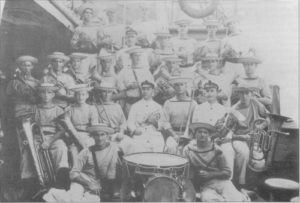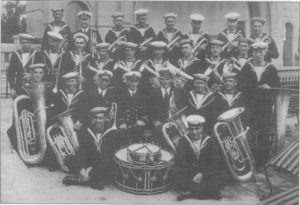- Author
- Greedy, Ashton W., AM, LRAM, DipMusMan, Commander, RAN
- Subjects
- History - general
- Tags
-
- RAN Ships
- None noted.
- Publication
- December 1999 edition of the Naval Historical Review (all rights reserved)
A few days after setting up camp in Sydney Cove, Captain Phillip was duly installed as Governor of the colony, an event marked with due ceremony by Drum Major Benjamin Cook and the eight Marine Drummers and Fifers who, it is recorded, played ‘several pieces suited to the business’. At the conclusion of the ceremony the Marines fired three volleys, each of which was interspersed by the band playing ‘God save the King’. This was the first performance of military music in our country.
We jump to 1st January 1901 when the Commonwealth of Australia came into being. The Duke of Cornwall and York (later to become King George V) opened the first Parliament in Melbourne in May of the same year. As Colonel-in-Chief of the Royal Marines, it was most fitting that the Duke should bring with him to Australia in HMS Ophir, the Band of the Chatham Division Royal Marines. Just three years later the first sea-going band formed entirely of Royal Marines trained at the newly established Royal Naval School of Music at Eastney, commissioned HMS Euryalus for service as flagship of the Royal Navy’s Australian Squadron.

Some months prior to the commissioning of HMAS Australia at Portsmouth on 21st June 1913. six musicians recruited in Melbourne were sent to England to join up with a number of ex-Royal Marine and British Army Bandsmen to form a band for the flagship. They were trained at Eastney and kitted-up as Royal Marines but with distinguishing RAN buttons and cap badge (a rig they were to wear until 1960 and changed because the Army received the accolades for the Navy Band’s efforts during the Opening Ceremony of the 1956 Melbourne Olympics). The first Band of the RAN arrived in Sydney in HMAS Australia on 4th October 1913.
Following war service in Australia in both the Pacific and the North Sea, the bands were eventually moved, with the ‘flag’, to the light cruisers Melbourne and Sydney during the period 1920-1928. Although these were only small bands, the Bandmaster was elevated to Warrant Officer status with the appointment of Warrant Officer Bandmaster Joshua Ventry on 1st April 1920 – a sea-going position he held until his retirement with an MBE in 1935. As part of the expansion of the RAN during the late twenties and early thirties, bands served in Australia II and Canberra, and a band was established at the growing Flinders Naval Depot (now HMAS Cerberus) in 1927 under ex-RM Bandmaster E.P. Snook.
In 1937 Snook’s replacement at FND was an ex-RM Corporal Frank Cockshead who transferred to the RAN in 1921 after serving in HMS New Zealand at Jutland. Cockshead remained at FND until his retirement in 1949 after 41 years of maritime music-making. He was promoted to Bandmaster Lieutenant in March 1947. In 1935 Australia with band embarked, attended the Silver Jubilee Fleet Review at Spithead – a trip which was to be repeated by Melbourne’s band in 1977.

With the addition to the RAN in the late thirties of Sydney, Perth and Hobart, the band again grew under Cockshead and Fleet Bandmaster WO Henry A. Blaskett who survived the sinking of Canberra in 1942. ‘Harry’ Blaskett had joined the RAN in the early twenties after service with the Army in WW I at Gallipoli and in France. He also retired in 1949 as a Bandmaster Lieutenant. During WW II RAN musicians served with distinction at sea in cruisers, having action stations in the Transmitting Station and as ammunition and stretcher parties. Band Branch casualties were among the highest in the RAN with the loss of the entire Sydney band (Bandmaster E.V.L. Stear) and casualties in Perth, Canberra and Australia.
By the end of the 1940s the strength of the RAN Band Branch was at an extremely low level due to pensions, demobilisation and generally poor recruiting. This coincided with the retirement of stalwart Band Officers Cockshead and Blaskett. The Royal Marines were asked to assist and the task of reviving the Branch and establishing a music school at Cerberus was given to Commissioned Bandmaster and later, Lieutenant RM, C.G. McLean DSM, LRAM, RM. Over a period of some four years Gordon McLean enlisted over one hundred adult and boy musicians and supervised their training at Cerberus thus providing the RAN in the late fifties, with quality military bands. His work as the first appointed Director of Music earned him an MBE in the Coronation Birthday Honours List.




